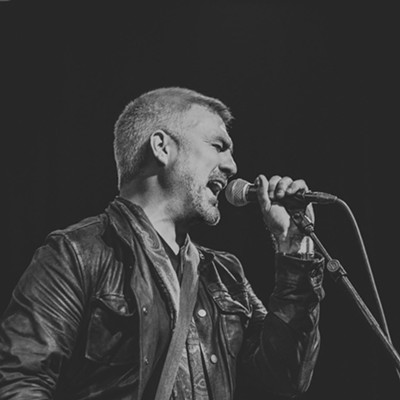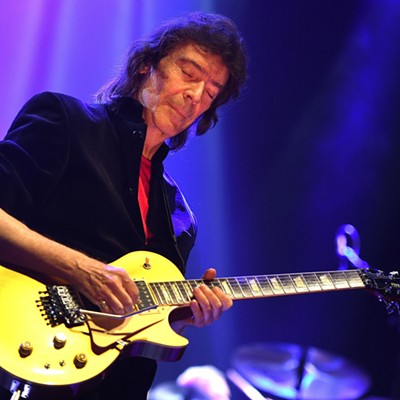If you know who wrote it, it's not a folk song," says folk singer Michael Cooney, a longtime practitioner of the genre and a former Tucsonan.
"My whole thing is that, through the oral process, when a person learns a song from someone else, they add their own things to it," Cooney says on the phone from his home in Friendship, Maine, where two weekends ago there was still snow on the ground in the shady spots.
"And as people learn a song, maybe they forget bits and change other bits, accidentally or on purpose. They'll play it for other people, who might change it themselves, and so on. And ultimately, through this passing on of the tradition, the song evolves and it becomes a pretty interesting piece of folk art."
Cooney would further argue that folk songs aren't static artifacts in a museum, but living things, constantly in transition. Among prominent examples of folk songs that have evolved over the decades are compositions widely known as "The Banana Boat Song," "Tom Dooley," "La Bamba" and "Wimoweh."
And, Cooney hastens to add, "Most of the songs I sing are not folk songs according to this definition, because somebody has written them, and I like to give them credit. But it's just a question of distinguishing real folk songs from the music that a singer-songwriter has created."
Cooney also likes another definition of folk music: "I've often heard this attributed to other people, but I think it was Big Bill Broonzy, who said in a Studs Terkel radio interview, 'I guess all songs is folk songs. I never heard no horse sing 'em.' "
Cooney will return to Tucson for three appearances at this weekend's 29th annual Tucson Folk Festival.
All of his appearances are scheduled for Sunday. He'll play a 30-minute set at noon on the Plaza Stage. At 1 p.m., he'll conduct a workshop titled "What's a Folk Song" in the Moore Courtyard at the Tucson Museum of Art.
And at 3 p.m., Cooney will join a panel discussion titled "Tucson Folksingers 1955-1962" at the Joel D. Valdez Main Library, 101 N. Stone Ave. Cooney joined the Folksingers, an ad-hoc group-cum-movement, as a Tucson teenager. The discussion will be moderated by Ted Warmbrand—a prominent musician, folk singer, promoter and activist.
Presented by the Tucson Kitchen Musicians Association, and always free, the Tucson Folk Festival this year will feature 20 hours of live music on Saturday, May 3, and Sunday, May 4. More than 120 artists from Tucson and across the country will play on five downtown stages.
In addition, the festival offers instrumental, singing and songwriting workshops; a children's show; a young artists' showcase; a songwriting competition; a ballad tree; a tribute to the late Pete Seeger; and lots of food and craft vendors spilling out from El Presidio Park.
This year's headliners are the Sonoran Dogs, led by local flat-picking legend Peter McLaughlin, who will close the Saturday festivities with a 9 p.m. set; and Run Boy Run, a second-generation bluegrass band based in Phoenix and Tucson that will bring the festival to a close with an 8 p.m. performance Sunday.
Among the special guests at the festival are singer-songwriter Hans Mayer, who will perform an all-ages set at 5:30 p.m. Saturday and a children's show at 3 p.m. Sunday, and the duo Ryanhood, which will precede Run Boy Run on Sunday with a 7 p.m. set. For a complete schedule of performances, see tkma.org.
Cooney will help recall some of Tucson's folk-music traditions as the Sunday panel discussion focuses on the Folksingers. A documentary about the group also is in the works.
"I joined them when I was high school, when I got excited about folk music and heard about this folk songs club. Not a lot of my school friends were as interested," Cooney says. "I guess we thought of (the Tucson Folksingers) as this group of middle-aged people who weren't that cool.
"Clyde Appleton, who was the leader of the group, and who is still around, was my eighth-grade music teacher, and I had no interest whatsoever in music then. He told me later that he thought I would never have a career in music," says Cooney, who went on to spend more than 40 years as a working musician.
"Tucson Folksingers had an impact the way everything has an impact—little ripples which interact with other ripples ad infinitum. Everything I carry from then is filtered though the gauze of my own perceptions and misperceptions of then, and now. I remember the good feeling of swapping songs, and hearing Clyde lead a great song I'd never heard before."
Cooney was born in 1943 in California, but his parents moved to Tucson when he was about 6 months old, and he was raised in the Old Pueblo, where he played as a teenager in various ensembles with his friends. Since leaving Tucson in the early 1960s, he has toured the country, from the San Diego and San Francisco areas to Denver and the Midwest, and up and down the East Coast. He has played with such like-minded musicians as Bobby Kimmel, Travis Edmonson and Jerry Garcia, among many others.
During his years as an itinerant musician, his modes of transportation often included hitchhiking or jumping freight trains.
He plays 6- and 12-string guitars, banjo, concertina, harmonica, penny whistle and jaws harp. He performs "real folk songs, old popular and novelty songs and found songs of wit and wisdom," sort of running the gamut of folk music, according to its various definitions.
Cooney has been mostly retired from performing for the past decade, but plays the occasional benefit in Maine. However, simply playing a show entails considerable preparation. "Now I am so rusty, I have to practice for several weekends in advance to get back in shape for one gig," he says.
And he rarely leaves Maine, so the trip to Tucson this weekend is a big deal. "I hate to fly. I mean, I hate to go the hardware store. I am traveled out."







